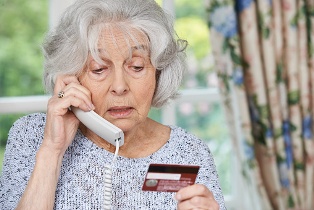Robocalls (prerecorded, automated phone calls), are illegal in the US – but when they are used on the elderly, it’s not only illegal; it’s cruel.
Several years ago, the Federal Trade Commission reported that consumers lose about $350 million a year due to robocalls. With the senior citizen community being of the most susceptible to these losses, and with more and more seniors electing to live independently, this fact should raise flags for anyone who has an elderly parent or relative living alone.

Of course, phone scams have been a problem for a long time – but in recent years, they’ve become more and more difficult to avoid.
Starting in 2003, the Do Not Call Registry made it possible for people to simply avoid most of these calls (excluding charities, surveys and some other callers).
For about seven years, this tactic worked well, especially since making phone calls was time-consuming and often expensive. Now, however, most of these calls are prerecorded and automated, with systems that can call thousands of numbers at once. In addition, international calling and disguising numbers or displaying false Caller IDs have become easy and cheap, so it’s no loner a major investment to call anyone, anywhere – whether or not they actively requested not to be called.
As a result of this, seniors and home-bound patients across the US have become more susceptible to phone scams than ever, whether it’s the infamous “IRS” scam demanding payment or even a small company looking to forcefully or deceptively attain new customers.
One such company is a medical alert company called Lifewatch USA, who not only use robocalls, but have built a system that directly targets senior citizens.
According to BestCompany.com, “Lifewatch, Inc. has recently been charged by the Federal Trade Commission (FTC) and the Florida Attorney general for practicing the use of robocalls to get consumers to purchase their product.”
Their first tactic when pursuing new customers is to call the same number countless times, leading potential victims to believe that someone is genuinely trying to get through to them. When victims answer the call – or even call back – a prerecorded voice begins asking questions “to determine eligibility for services as well as free shipping.”
The questions seem to be directed at identifying seniors who live alone and are at risk of falling or other dangers that may require immediate medical attention. However, regardless of the victims replies, the recorded voice goes on to say that have been approved for their services as well as free shipping.
The voice is carefully recorded to sound realistic enough to people who are more easily fooled – complete with typing sounds, random personal questions and lame jokes.
Finally, victims who stick with the robot long enough are put through to a real salesperson who then has to convince them to pull out their wallets and sign up for a system they never knew they needed until that moment.
After having been a recipient of their robocalls myself, I decided to find out: is it a legitimate company using a less-than-legitimate (or downright illegal) way to draw in new customers, or do their illicit practices extend to their services, as well?
After reading through many online reviews on Google+, Yelp and more, I quickly learned that most reviewers find their services unreliable and their policies unethical.
This led me to the (unscientific) conclusion that companies that use robocalls are probably not the kind of people you want to do business with – and you may want to take extra steps to protect your elderly loved ones from falling into their traps.
To learn what you can do to prevent robocalls that cause not only aggravation but serious monetary loss, read this article by ABC News about robocall prevention.






